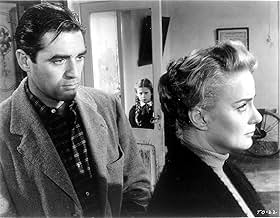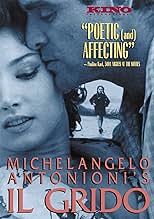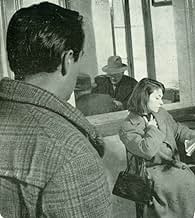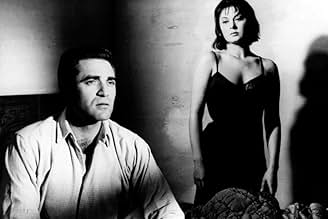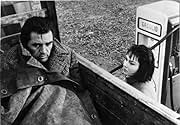VALUTAZIONE IMDb
7,6/10
5788
LA TUA VALUTAZIONE
Un uomo vaga senza meta, lontano dalla sua città, lontano dalla donna che amava, emotivamente e socialmente inattivo.Un uomo vaga senza meta, lontano dalla sua città, lontano dalla donna che amava, emotivamente e socialmente inattivo.Un uomo vaga senza meta, lontano dalla sua città, lontano dalla donna che amava, emotivamente e socialmente inattivo.
- Regia
- Sceneggiatura
- Star
- Premi
- 3 vittorie e 2 candidature totali
Gabriella Pallotta
- Edera, her sister
- (as Gabriella Pallotti)
Jacqueline Jones
- Andreina
- (as Lyn Shaw)
Pietro Corvelatti
- Fisherman
- (non citato nei titoli originali)
Elli Parvo
- Donna Matilda
- (non citato nei titoli originali)
Recensioni in evidenza
In the Antonioni canon "Il Grido" is often cited as one of his lesser works, superseded by the trilogy that began with "L'Avventura" and even his later English-language films, "Blow Up" and "The Passenger". Granted this remarkable film doesn't quite hit you between the eyes in the way others do but remarkable it is, a grim tale of working-class misery set in a misty, wet Po Valley and concerned, like much of Antonioni's work, with a loss or lack of love.
Perhaps the critics of the time weren't too happy with Antonioni's decision to cast the American Steve Cochran as the brutish anti-hero Aldo. Cochran had to be dubbed as did a number of his co-stars, including Alida Valli and Betsy Blair. In his own country Cochran was never rated as much of an actor but he is superb here as a man deserted by the woman he had hoped to marry, (Valli), and who then takes to the road with his young daughter.
If anything, the film is proof that Antonioni wasn't just a great chronicler of upper and middle-class angst but someone who could deal with the universal themes of loss and grief. It's certainly downbeat. From the outset it's a film that offers no hope for its characters and is probably the director's most pessimistic work. His use of location is, of course, crucial; its bleakness mirrors its characters lack of hope and Cochran's Aldo is one of cinema's great existentialist working-class heroes while, even dubbed as here, both Valli and Blair are excellent and Gianni Di Venanzo's cinematography is superb. This is a film crying out for rediscovery and simply shouldn't be missed.
Perhaps the critics of the time weren't too happy with Antonioni's decision to cast the American Steve Cochran as the brutish anti-hero Aldo. Cochran had to be dubbed as did a number of his co-stars, including Alida Valli and Betsy Blair. In his own country Cochran was never rated as much of an actor but he is superb here as a man deserted by the woman he had hoped to marry, (Valli), and who then takes to the road with his young daughter.
If anything, the film is proof that Antonioni wasn't just a great chronicler of upper and middle-class angst but someone who could deal with the universal themes of loss and grief. It's certainly downbeat. From the outset it's a film that offers no hope for its characters and is probably the director's most pessimistic work. His use of location is, of course, crucial; its bleakness mirrors its characters lack of hope and Cochran's Aldo is one of cinema's great existentialist working-class heroes while, even dubbed as here, both Valli and Blair are excellent and Gianni Di Venanzo's cinematography is superb. This is a film crying out for rediscovery and simply shouldn't be missed.
Other reviews to the contrary, if you found Le Notte or L'Eclisse lacked sufficient plot, I doubt you'll enjoy Il Grido. However, unlike later Antonioni, the focus here is not on fear of commitment & loss of passion, but on a classic spurned lover. Like L'Eclisse, Il Grido begins with breakup, magnificently acted & powerfully filmed; we feel each shudder of pain. In fact, both films' power rests on us sharing this experience, second by second, nerve-end by nerve-end. Note Irma's efforts to hold to the fabric of order & routine to keep a lid on Aldo's fury & the careful portrayal of Aldo's frustrations.
Il Grido's opening builds to a very public & final breakup. It initiates Aldo's journey away from Irma & home. I kept thinking of Schubert's song cycle, Winterreise. In both, after rejection the protagonist's world ceases to hold together. Only here the descent isn't into winter but into fog, industrial sprawl, & ever more spartan existence. Even the piano which accompanies Aldo reminded me of lieder.
The opening's not quite picturesque scenery may suggest nurturing home values. Unlike couples in other Antonioni classics, Aldo & Irma have a daughter, & to Aldo their lives seemed fulfilled. The almost picturesque is soon replaced by encroaching industrial sounds & images. Several times we see trees felled as an old order is being swept away. At film's end, the whole town is slated for demolition, & we are asked to contemplate the relation between the Winterreise-like main text of lost love & this subtext of industrial sprawl & oppressive, intrusive government. No clear connection is given, but as in later Antonioni, the images work their effect as much on our subconscious as on our intellect; whether we can verbalize our thoughts or not, we feel this rupture with earlier values & social structures. For me, Il Grido is a more honest film than L'Avventura. If it lacks a bit of the elegant, refined photo compositions of Antonioni's trilogy, it rests on the same detailed, carefully structured cinematography.
Il Grido's opening builds to a very public & final breakup. It initiates Aldo's journey away from Irma & home. I kept thinking of Schubert's song cycle, Winterreise. In both, after rejection the protagonist's world ceases to hold together. Only here the descent isn't into winter but into fog, industrial sprawl, & ever more spartan existence. Even the piano which accompanies Aldo reminded me of lieder.
The opening's not quite picturesque scenery may suggest nurturing home values. Unlike couples in other Antonioni classics, Aldo & Irma have a daughter, & to Aldo their lives seemed fulfilled. The almost picturesque is soon replaced by encroaching industrial sounds & images. Several times we see trees felled as an old order is being swept away. At film's end, the whole town is slated for demolition, & we are asked to contemplate the relation between the Winterreise-like main text of lost love & this subtext of industrial sprawl & oppressive, intrusive government. No clear connection is given, but as in later Antonioni, the images work their effect as much on our subconscious as on our intellect; whether we can verbalize our thoughts or not, we feel this rupture with earlier values & social structures. For me, Il Grido is a more honest film than L'Avventura. If it lacks a bit of the elegant, refined photo compositions of Antonioni's trilogy, it rests on the same detailed, carefully structured cinematography.
Films like Il Grido are nearly impossible to qualify or calculate on any real scale simply because they do not adhere to conventional rules of filmmaking. Michelangelo Antonioni's existential journey is very episodic in nature as we watch a self-contained man travel away from his lover in search of more fulfilling relationships after she turns down his marriage proposal. What follows may or may not make an emotional impact on the viewer as it is very languid pacing and tediously told. Antonioni fills the screen with endless long shots and long takes of the most desolate, empty and vast areas possible, especially for a country known to be so vibrant and fruitful as Italy. This seems to represent the protagonist's soul, his yearning for some sort of satisfaction that he cannot seem to grab a hold of. Despite the downtrodden mood of the film, it is a captivating journey, exploring the depths and lengths to which humans seek pleasure in any form. Of course, this assumes that pleasure is the right word.
For those who've been attending the Retrospective religiously, one of the best bits during the screening is the introduction to each movie as presented by Lorenzo Codelli, where he shares some little known facts of the movie with the audience. Today we were told that Monica Vitti actually was featured in Il Grido, not in person though but providing the dubbed voice behind Dorian Gray's character Virginia. So their collaboration stretched further back, even before L'Avventura.
The story centers on a working class sugar refinery worker Aldo (American actor Steve Cochran) who we learn has waited for 7 years cohabiting with Irma (Alida Valli), whose husband had recently passed away while in Australia. Thinking that this is a blessing in disguise in that he can finally marry Irma, Aldo gets the biggest surprise when he learns that the love of his life had in the last 4 months, given her heart to someone else. In rage he dished out unforgivable physical violence in public on her, and with a broken heart, picks up his daughter Rosina (Mima Girardi) to embark on an aimless road trip, wandering all over Po valley (which was the subject of one of Antonioni's early documentary).
Shot in the great outdoors, there's always a lingering mist in the first half of the movie, as if to accentuate Aldo's state of uncertainty and blur in his current state of life, without a clue what lies ahead as he drifts from location to location, and from person to person, as if like a person on a rebound, latching onto every opportunity that present itself to him, but all this while having absolutely no plans and unsure of what to do. While he seeks out his first love Elvia (Betsy Blair) and there comes this speed boat race, I thought Il Grido really picks up when he wanders toward a highway petrol kiosk, and meets with Virginia (Dorian Gray) and her alcoholic aged father (played by Guerrino Campanini).
Romancing the lady boss for food and lodging, having his daughter at his side demonstrated in truth that his relationship with and welfare for his daughter takes precedence over everything else, so while on the surface he might seem aimless, deep down he still bears a sense of responsibility to provide for Rosina, which probably gave him an invisible guiding hand in what he was doing, until of course he clinically evaluated and decided otherwise.
As he goes from woman to woman, having short temporal relationships with everyone we see on screen from Elvia to Andreina (Lynn Shaw), each played out like small skits, but a common thread running through it is that the characters here seem to be people who have wasted away their prime, missed the boat and are holding out for one last possibility at true love and happiness. Irma found hers although at Aldo's expense, and everyone else demonstrated memories with loved ones whom they cannot forget. The ending is nothing less than heart- wrenching, a discovery and affirmation of sad truths when people indeed have moved on, but then you realize that insofar you're still stuck in a rut. Very depressing if you ponder over it.
The last act also dwelt on impending change, with landscape changes ordered from the top, with common people on the ground being forced to accept these changes, with little regard to their livelihood. I thought it provided a poignant moment to reflect upon such frenzy, and sometimes the insensitivity that comes together with forced policies probably, and hopefully for the greater good.
The story centers on a working class sugar refinery worker Aldo (American actor Steve Cochran) who we learn has waited for 7 years cohabiting with Irma (Alida Valli), whose husband had recently passed away while in Australia. Thinking that this is a blessing in disguise in that he can finally marry Irma, Aldo gets the biggest surprise when he learns that the love of his life had in the last 4 months, given her heart to someone else. In rage he dished out unforgivable physical violence in public on her, and with a broken heart, picks up his daughter Rosina (Mima Girardi) to embark on an aimless road trip, wandering all over Po valley (which was the subject of one of Antonioni's early documentary).
Shot in the great outdoors, there's always a lingering mist in the first half of the movie, as if to accentuate Aldo's state of uncertainty and blur in his current state of life, without a clue what lies ahead as he drifts from location to location, and from person to person, as if like a person on a rebound, latching onto every opportunity that present itself to him, but all this while having absolutely no plans and unsure of what to do. While he seeks out his first love Elvia (Betsy Blair) and there comes this speed boat race, I thought Il Grido really picks up when he wanders toward a highway petrol kiosk, and meets with Virginia (Dorian Gray) and her alcoholic aged father (played by Guerrino Campanini).
Romancing the lady boss for food and lodging, having his daughter at his side demonstrated in truth that his relationship with and welfare for his daughter takes precedence over everything else, so while on the surface he might seem aimless, deep down he still bears a sense of responsibility to provide for Rosina, which probably gave him an invisible guiding hand in what he was doing, until of course he clinically evaluated and decided otherwise.
As he goes from woman to woman, having short temporal relationships with everyone we see on screen from Elvia to Andreina (Lynn Shaw), each played out like small skits, but a common thread running through it is that the characters here seem to be people who have wasted away their prime, missed the boat and are holding out for one last possibility at true love and happiness. Irma found hers although at Aldo's expense, and everyone else demonstrated memories with loved ones whom they cannot forget. The ending is nothing less than heart- wrenching, a discovery and affirmation of sad truths when people indeed have moved on, but then you realize that insofar you're still stuck in a rut. Very depressing if you ponder over it.
The last act also dwelt on impending change, with landscape changes ordered from the top, with common people on the ground being forced to accept these changes, with little regard to their livelihood. I thought it provided a poignant moment to reflect upon such frenzy, and sometimes the insensitivity that comes together with forced policies probably, and hopefully for the greater good.
In the total of Antonioni's films, 'Il grido' (= Italian for 'the outcry') makes an exception: it is entirely set in a worker's environment. Usually Antonioni's actors and actresses perform people who don't earn their living by physical labor.
Produced shortly before Antonioni's famous trio 'La Notte', 'L'eclisse' and 'L'avventura', this film from 1957 clearly shows the theme Antonioni got so famous with: men losing their roots, being dislocated & disoriented by the advancement of technology. Around 1960 this pessimism was very current.
On top of this, 'Il grido' carries every other Antonioni-feature. Fine shooting, while emphasizing on geometries in buildings and landscapes (Antonioni was educated as an architect). First class actors and actresses who seldom laugh and make joy. And, as I already mentioned, a pessimistic theme linked with some grand-scale technical advancement.
Antonioni is renowned as 'the poet of misery'; 'Il grido' is quite in line with this statement.
Produced shortly before Antonioni's famous trio 'La Notte', 'L'eclisse' and 'L'avventura', this film from 1957 clearly shows the theme Antonioni got so famous with: men losing their roots, being dislocated & disoriented by the advancement of technology. Around 1960 this pessimism was very current.
On top of this, 'Il grido' carries every other Antonioni-feature. Fine shooting, while emphasizing on geometries in buildings and landscapes (Antonioni was educated as an architect). First class actors and actresses who seldom laugh and make joy. And, as I already mentioned, a pessimistic theme linked with some grand-scale technical advancement.
Antonioni is renowned as 'the poet of misery'; 'Il grido' is quite in line with this statement.
Lo sapevi?
- QuizMichelangelo Antonioni's first collaboration with his future muse and lover, Monica Vitti. Although Vitti doesn't physically appear in the film, she dubbed the Italian lines for Dorian Gray.
- BlooperTutte le opzioni contengono spoiler
- ConnessioniFeatured in Nuovo Cinema Paradiso (1988)
I più visti
Accedi per valutare e creare un elenco di titoli salvati per ottenere consigli personalizzati
- How long is Il Grido?Powered by Alexa
Dettagli
Botteghino
- Lordo Stati Uniti e Canada
- 16.549 USD
- Fine settimana di apertura Stati Uniti e Canada
- 6536 USD
- 10 nov 2024
- Lordo in tutto il mondo
- 17.413 USD
- Tempo di esecuzione
- 1h 56min(116 min)
- Colore
Contribuisci a questa pagina
Suggerisci una modifica o aggiungi i contenuti mancanti


